
From Gordon Brown to UK Ad Execs, LEAD 2024 Speakers Explore ‘Responsible Growth’

In her welcome address as LEAD 2024’s host, journalist and broadcaster Samira Ahmed outlined a context of UK advertising in an election year. While ‘responsible growth’ was the overall theme of the Advertising Association’s annual summit, she opened by promising discussions on the economy, politics, public trust in advertising, sustainability, AI’s potential and the “so-called cookie-pocalypse”, as well as some discussion of great creativity along the way too, in case we forget what business this is. LBB’s Alex Reeves rounds up the highlights of a day that brought adland and Westminster face to face.
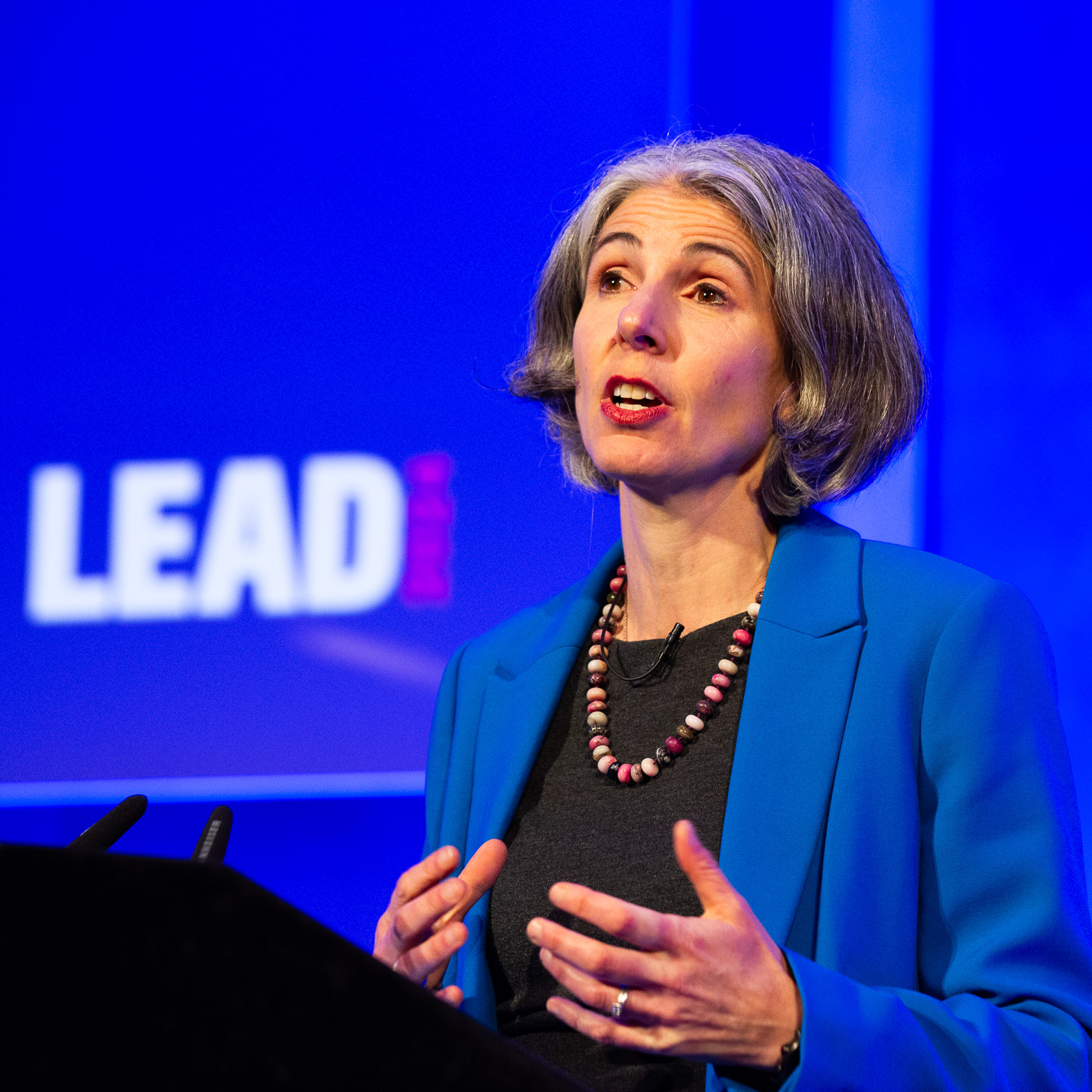
The UK’s Economic Outlook
The Confederation of British Industry’s chief executive Rain Newton-Smith apologised for having “brought the weather with me” as the soggy morning outside the QEII Centre in Westminster lived up to her name. She centred the first keynote of the day on Britain’s overall economic outlook. Drawing on her perspective at the heart of UK business, she spoke about the importance of a positive economic vision to strengthen the UK’s competitiveness; preparing for the future of work; securing green growth and staying at the forefront of technology and innovation.
In an election year, Rain stressed the “need for growth that is sustainable, not fueled by pre-election giveaways, but one that is predicated on the bedrock of stability.” Reducing inflation is key to allow this kind of growth, said the CBI head, adding, “we need to keep large-scale tax cuts off the table.” Instead, investment is her favoured route to a better place for UK business. “Above all, it must come with real investment in people skills. And capabilities in infrastructure and innovation,” she said.
Rain went on to lay out the CBI’s roadmap to growth, based around three areas in which the right choices must be made. First, making the UK a trusted destination for investment. Second, to be open to talent, “to use all the tools available, including immigration, to unlock investment and transform the economy.” Thirdly, she outlined why the UK must make sure it has green growth that benefits everyone.
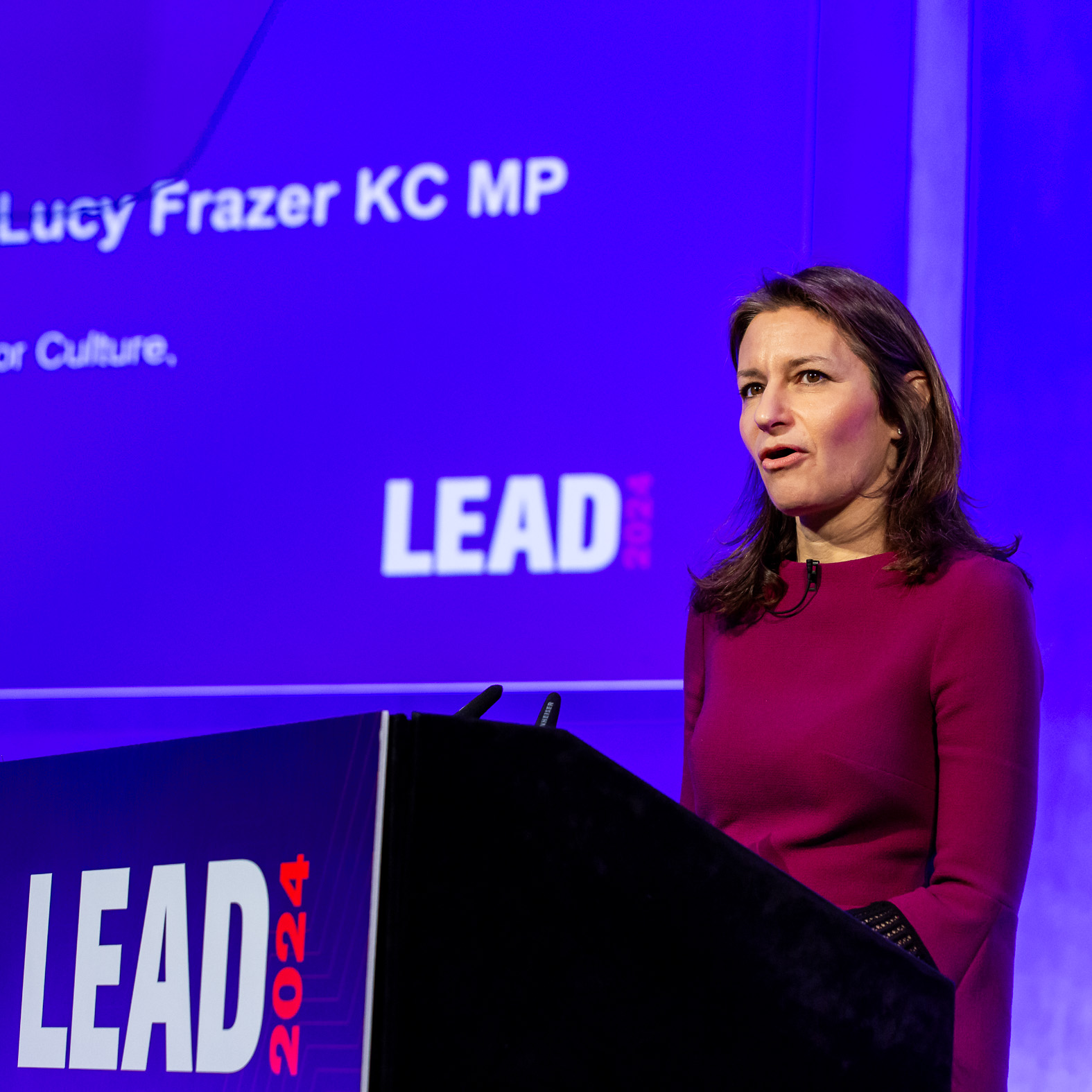
Government Keynote
Kicking off the political segment of the morning, Lucy Frazer MP, secretary of state for culture, media and sport, outlined the government’s plans for the creative industries and highlight her key priorities for 2024. Beginning by recognising “what [the advertising] industry does for our economy,” she went on to attribute recent growth and value of UK advertising as “a credit to the way our companies have become magnets to the best ingenuity, creativity, and the best talent.”
The secretary of state’focused on the government’s plans for ensuring advertising has access to the right talent and skills. She mentioned an intention to deliver more cultural and art education and offer support for apprenticeships and noted that the government is working closely with the Advertising Association and IPA on a corporate creative careers programme that will help encourage 11 to 18 year olds to pursue creative careers.
“We're looking closely at how to ensure creators have the control and transparency they need over their content when it is used by AI models. And we're committed to also ensuring that data is used responsibly,” she said.
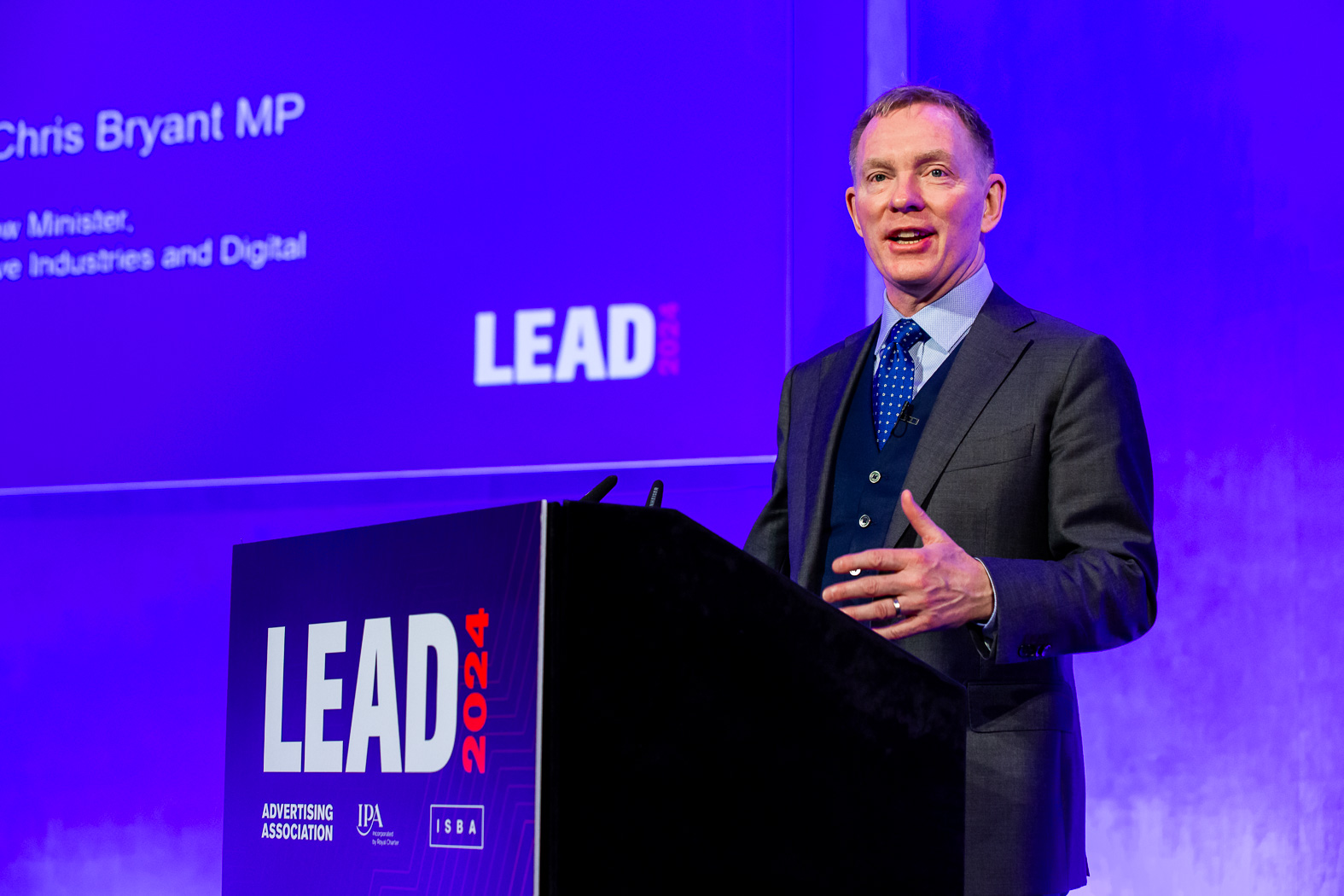
Opposition Keynote
The keynote from the government’s opposition came from Sir Chris Bryant MP, shadow minister for creative industries and digital. It focused on Labour’s aspirations for the creative industries in the coming year – one in which a new Labour government could be on the cards.
After extolling the virtues of creativity and reminiscencing about great ads, the shadow minister stated the value his party places on the ad industry. “The creative industries, I can assure you, will be at the heart of Labour's key mission which is to grow the economy faster than any other economy in the G7. Yes, that's ambitious, Yes, we can only do that if we grow the creative industries, at least at the pace they’ve grown at the last few years, and I would argue, much faster.”
He added that restoration of prestige and focus on creative education “it is a force multiplier” a Labour government would be delighted to bring about, alongside apprenticeship system support and better distribution of geographical opportunity. He hopes for “clusters of creativity up and down the country.”
AI featured in his speech too as something that needs to be taken seriously, however he added that “flashes of genius, those quirky, unexpected twists, are the preserve, I would argue, of human intelligence.”
Finally, he put the onus on the ad industry to make sure children in his constituency want to have careers in advertising and know how to get there.
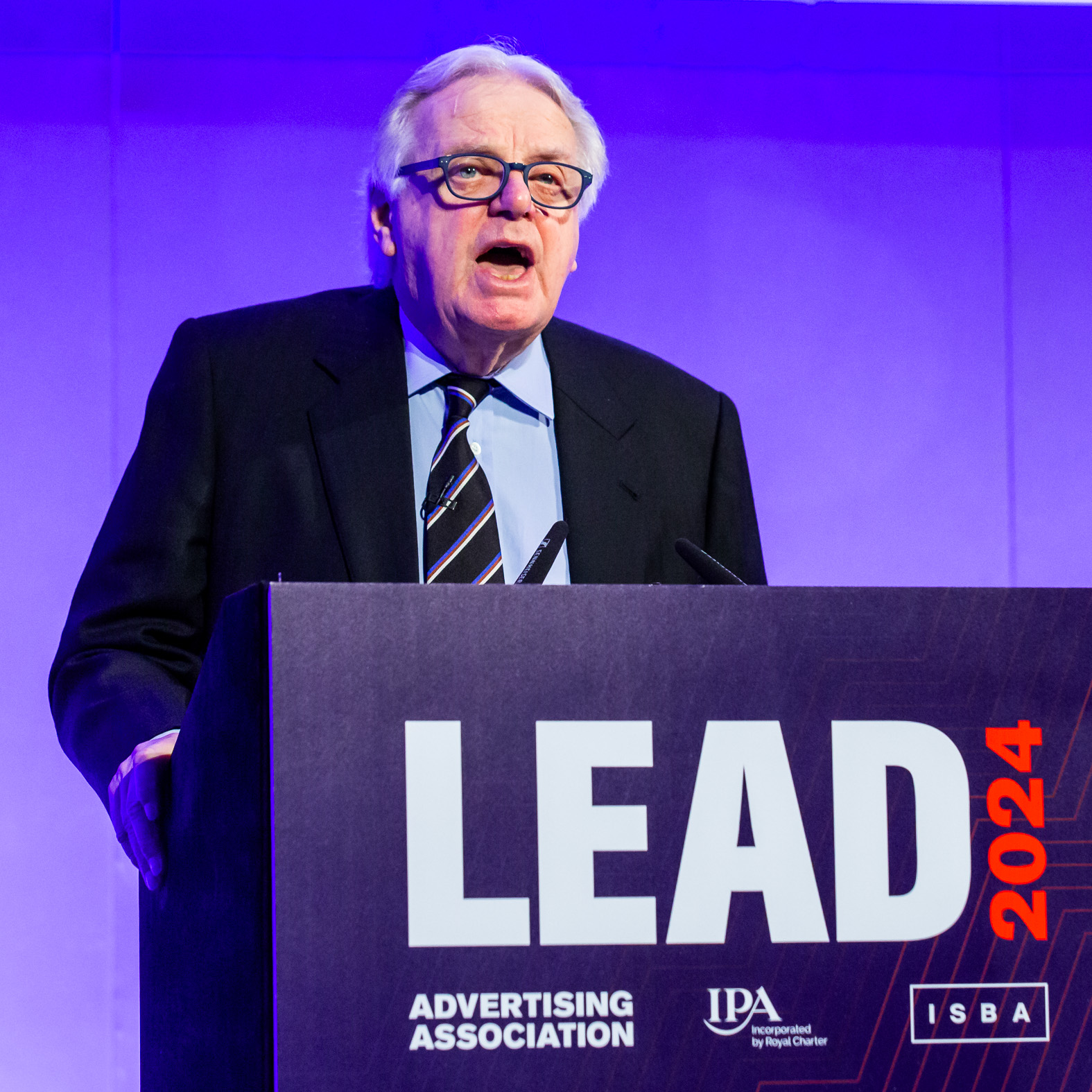
Advertising and the Online Safety Act
Lord Michael Grade, the chair of Ofcom built his address around the detail on the implementation of the Online Safety Act, highlighting specific points about advertising within the context of both broadcasting and online safety regimes.
He described this subject as “Ofcom’s new job,” as the body gets an expanded role to protect people online and on social media. He spoke about “a corner of the web that is toxic and long, long in need of some regulation.” Clarifying that Ofcom will not be regulating content itself online, but shining a light on the decisions companies make when they're designing and operating their services and products online.
The internet knows no borders, so Lord Grade posited the question in many’s minds: “Why should overseas tech giants comply with the regulator in the UK?”
He asserted that there is an advantage to doing so for these platforms brands and, ultimately, bottom lines. On accountability, companies who don’t comply may face fines or limitations by Ofcom or regulators elsewhere. Advertising is the third reason. Advertisers demand accountability for the online safety of platforms online. And while advertisers all want growth, he reminded the audience that “it must be responsible growth.”
“For brands and agencies, this is about making trust and safety a priority,” said Lord Grade. Pointing to the exodus that X has seen from major advertisers fleeing its platform as they question their brands safety there, he said: “It’s clear advertisers have unique levels in the fight against harmful content.”
He urged brands and agencies to support Ofcom. “Online Safety regulation is here. So please, make sure the platforms who carry your adverts know about it and are taking it seriously.”
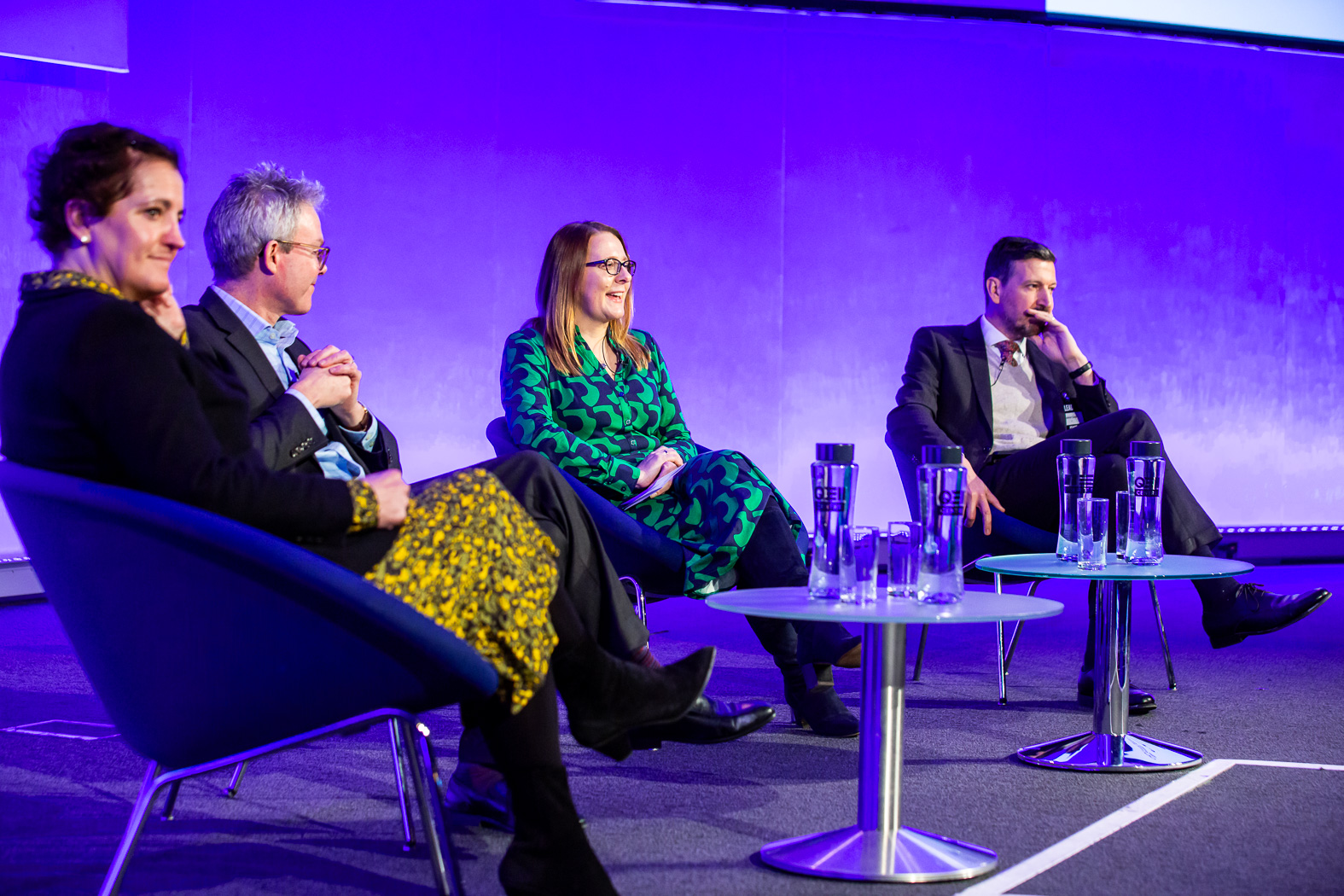
Public Trust in Advertising: Why the ASA’s Regulation Matters
The next panel followed on from that theme. ‘Public Trust in Advertising: Why the ASA’s Regulation Matters’ was chaired by Dame Annette King DBE, global lead for marketing practice at Accenture Song and chair of the Advertising Association. Joining her on the panel was Guy Parker, chief executive, Shahriar Coupal, director of advertising policy and practice and Donna Castle, director of communications, all from the Advertising Standards Authority (ASA).
For context, Anette started with othe cautiously optimistic insight that for the first time since 2014, advertising is no longer the least trusted industry in the UK. It’s now third least trusted, AA research shows, after media and government. She also reflected on the ASA’s own advertising campaign, which seems to have increased trust in advertising among those who saw the ads.
Guy laid out the basics of a five-year strategy for the ASAto provide AI-assisted active monitoring of content online. The ASA chief executive listed a series of focuses in the strategy that broadly amounted to more proactive operations as a regulatory body.
He went on to detail how data science is being used to filter through ads that may need human attention or be more likely to break ASA codes.
Guy stressed that humans are always in charge of the decisions, ultimately. “I think from an ethics point of view that's very important,” he said. Secondly, he highlighted the ASA’s efforts working with platforms to try and “fill gaps” in their systems where more visibility of ads is needed. Thirdly, these new systems should enable the ASA to highlight the best practice, rather than only flagging bad practice.
Greenwashing has been a crucial focus for the ASA recently and Guy spent some time delving into the authority’s research on how damaging to a brand inauthentic sustainability claims can be. The ASA provides a free 24-hour service to check projects against greenwashing or ‘greenhushing’ claims that could fall foul of regulations. “You can come to us for help,” he said.
The next subject was the ASA’s Intermediary and Platform Principles (IPP) pilot, which involved some of the largest companies in the digital advertising supply chain and to aimed to explore whether and how the UK advertising self-regulatory system might evolve to bring greater transparency and broader accountability to its work online..
It would be remiss not to discuss the Calvin Klein ads featuring FKA twigs that the ASA recently ruled as in breach of advertising codes. Guy stated that the decision was made “after a lot of care and a lot of debate and with a willingness to learn from the reaction to it.
“There’s been a strong reaction, particularly to the bit of the ruling that FKA twigs in the Calvin Klein campaign was presented as a sexual object. We’re thinking deeply about that at the moment.” He highlighted the “evidential underpinning” that the ASA makes efforts to ensure all its rulings are made upon, but concluded that “the challenge is that society does not think as one on these issues. One person’s sexual objectification is another person’s celebration of an empowered, strong woman.”
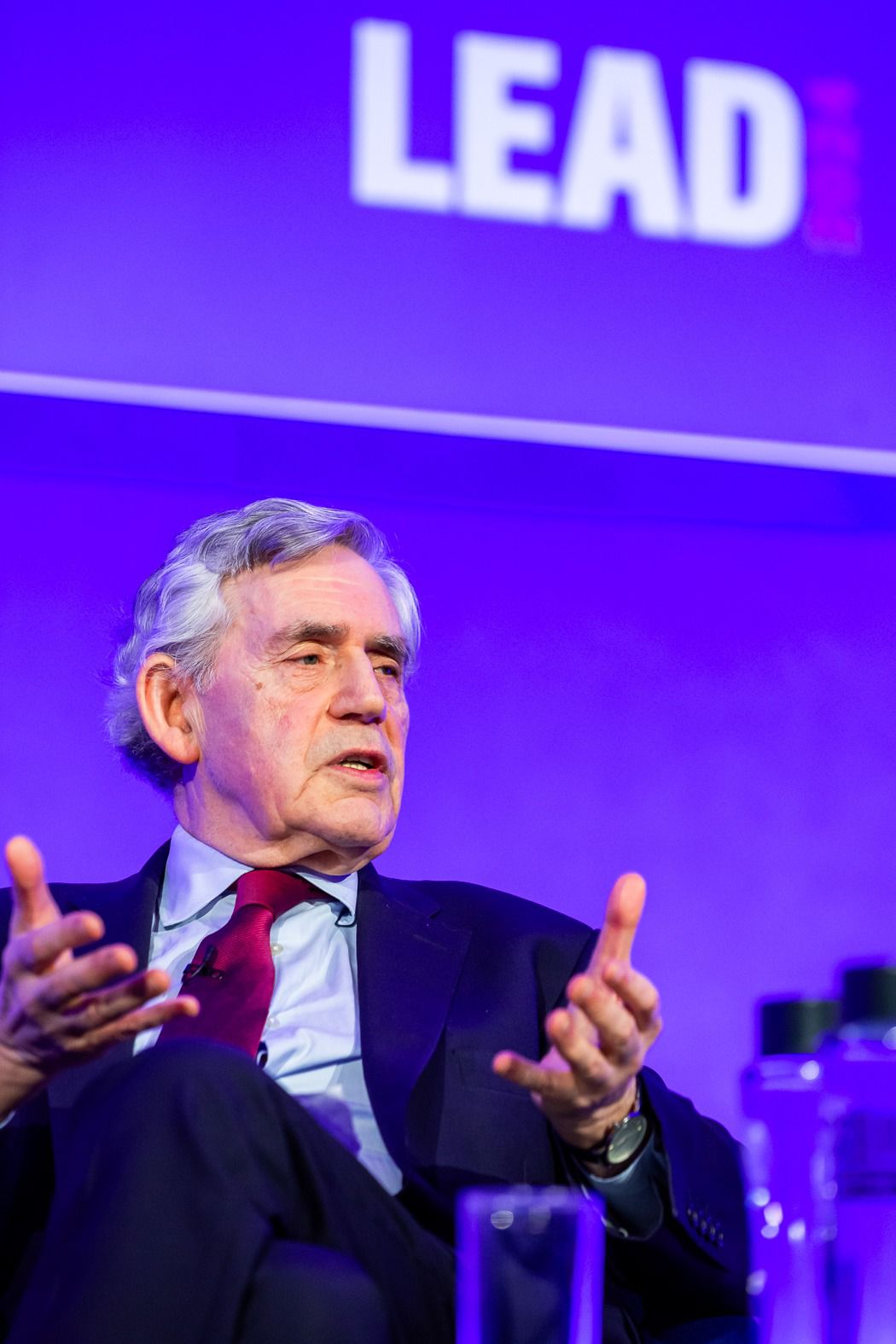
Gordon Brown’s Keynote Address
It was time for the ‘headline act’ of the day. An exclusive keynote from former prime minister, Gordon Brown, followed by audience Q&A.
“The world as it is and it might be,” was the former PM’s theme. His focus was inequality and its blight on UK society. The title was taken from the work of Albert Einstein. He followed with an advertising joke about Guinness and the pope, which brought the house down. It would be a disservice to print it here though.
With the crowd fully tuned in, Gordon moved on to the gravity of his main topic. “We are now seeing poverty in this country that I never thought was at any point again in my lifetime,” he said, recounting the conditions he grew up around in a Scottish mining town with slums that had not been rebuilt since the Victorian times that frequently flooded. “I thought I would never see that kind of poverty again.”
He shared some shocking figures. 400,000 are living in homes without cookers. 700,000 children will go to sleep tonight without a bed. 1.2 million people are living without proper floor coverings or other basic essentials for the home. 4 million people are destitute due to not having permanent accommodation. “This is poverty that is demeaning,” said the former PM, “it is demoralising, it’s dehumanising and it should not exist in the year 2024.”
But politicians are not paying attention to it, and neither is the media or advertising. “I think we’ve got a blind spot about the biggest social crisis in our country at the moment,” said Gordon.
“This is not the Britain we want our country to be. This is not who we are,” he went on. But the people in the room at LEAD 2024 have the power to help. “Corporate philanthropy has changed,” noted the ex politician, pointing out the social purpose which so many brands have found.
He was there to champion theMultibank initiative, co-founded by Amazon and Gordon Brown to take a holistic view of the needs of a family. There are banks across Scotland ,with several different hubs and are expanding across the rest of the UK to provide 500,000 families in need with basic essentials, donated from six multibanks by the end of 2024.
He named two ways companies can help: first, they can donate surplus goods to the right charities so they can get to people who need them, meaning The Multibank is “not just an anti-poverty initiative but an anti-pollution initiative.” £2 billion of surplus goods are being wasted that can be reused, said Gordon. “Just think of the companies that you deal with and what they can do… Don’t destroy; donate.”
Secondly, the initiative is looking to work with companies to sell products at cost to charities. The former PM wants to facilitate deals between companies who want to help with charities that have the budget to buy goods.
Finally he called for a “coalition of compassion,” arguing that it’s in companies’ interest to do something about this crisis. But it’s also in humanity’s interest.
The UK recently saw the power of storytelling to enact change, after the ITV drama ‘Mr Bates vs The Post Office’ provoked the government to bring about justice for the victims of a systemic scandal. We have not made it clear to people the sheer extent of the problems that many families face. “We need to show real life examples of what is happening.” Advertising has the tools to do that, he said.
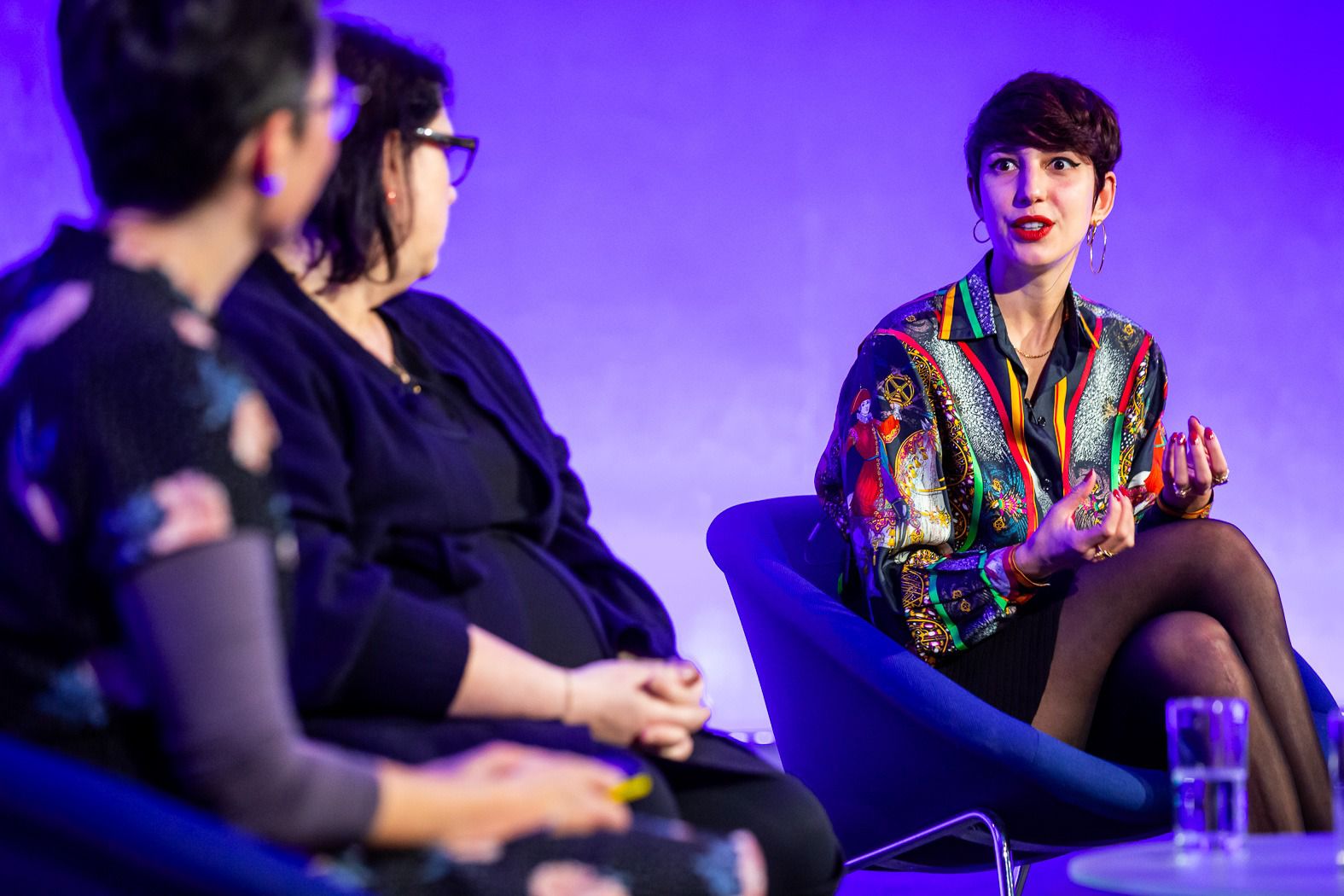
Greener Growth: Advertising’s Role in Shaping the Future of the Economy
Kate Waters, director of client strategy and planning at ITV continued to draw inspiration from ‘Mr Bates vs The Post Office’ in her introduction to the session ‘Greener Growth: Advertising’s Role in Shaping the Future of the Economy’. Applauding the power of storytelling to enact change, she said “ that is exactly what we need to step up to the climate crisis.”
She laid out the challenges facingthe ad industry to reach net zero, before welcoming to the stage Eve Williams, vice president and general manager at eBay UK and Chiara Manco, creative and media partnerships director at System1 Group. Together they took a deep dive into how advertising can foster positive changes in consumer behaviour, all while contributing to sustainable growth and profitability.
Eve took the sustainability discussions to unexpected places, such as challenging the fast fashion associations of ‘Love Island’ in favour of championing pre-loved fashion alongside the islanders – a campaign which brought to life more positive environmental behaviour. “It is a show that’s synonymous with style, whether you like that style or not,” said Eve. As a result, the e-retailer has seen a significant boost in pre-loved fashion sales on since.
Chiara was there to focus on ‘The Greenprint’ – a report drawing lessons and themes from best-in-class advertising that promote behaviour to combat climate change. Looking at 1,000 ads, it found that 8% of ads from the past three years depict some environmental message. However, ads often focused on the least impactful behaviours such as waste reduction or meat alternatives, and rarely spoke to behaviours that have shown to have more impact on emissions, such as circular fashion or energy choices. Kate noted the opportunity that seems to be there for advertisers to fill that gap.
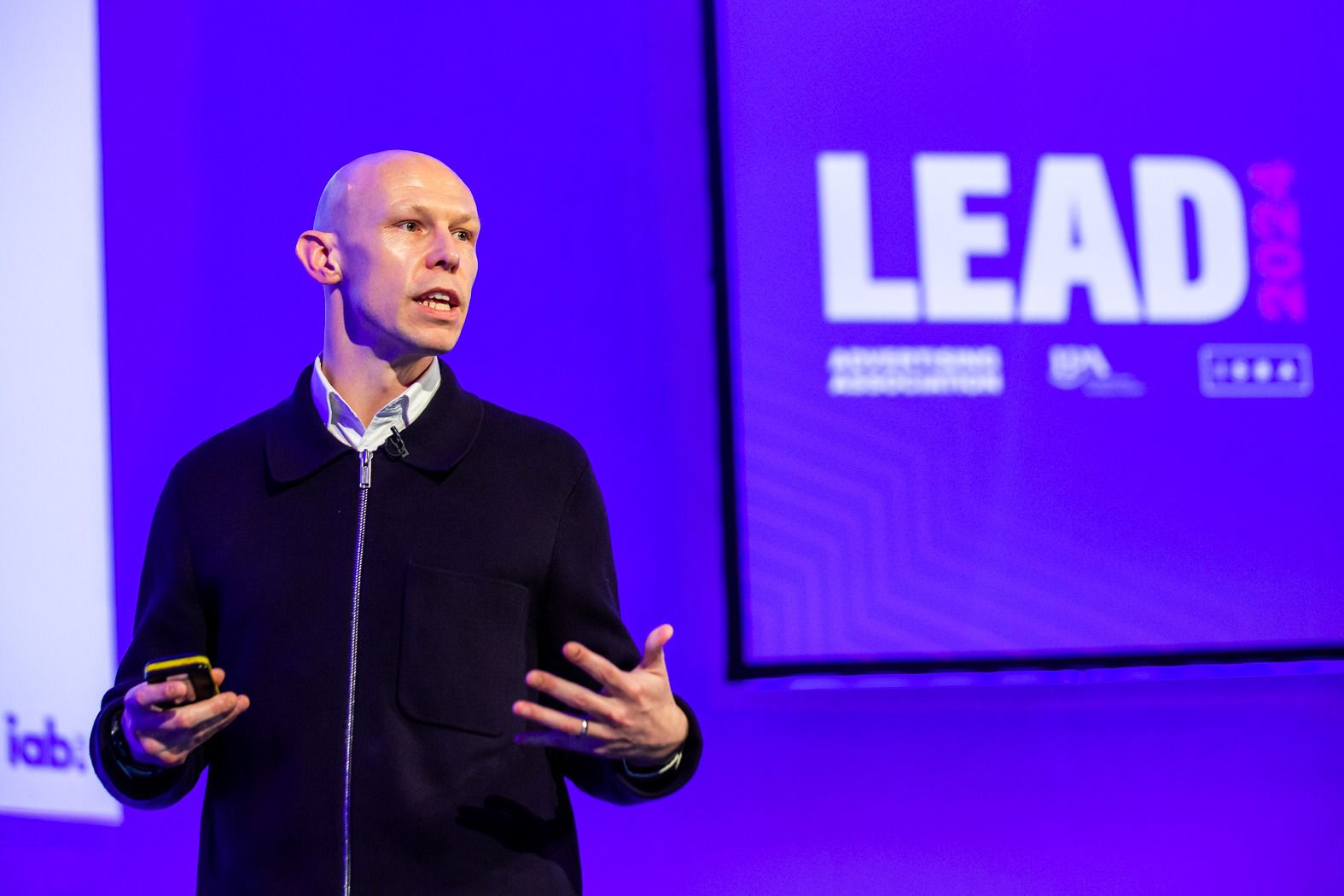
Advertisers’ Cookie Rodeo
James Chandler, chief marketing officer at IAB UK bounced on stage with the word ‘cookie-pocalypse’ echoing through the conference centre to discuss ‘Advertisers’ Sliding Doors Moment’. He joked that the end of third-party copies has been a long time coming (“the longest leaving do possible”) but that shouldn’t diminish its significance. “It’s a big deal,” he added – a threshold moment in the world’s perspective on privacy.
Why does this change feel so overwhelming? Digital advertising gives advertisers, IAB’s recent research found, with a deep-seated sense of unease and a growing sense of futility. The narrative around the end of cookies uses language that only feeds this feeling. The way through, James suggested, is to ask the right questions, investigate multiple solutions, and explore, test and feedback (he didn’t say “fail fast” but did assert that “stasis is not an option”).
In reassurance, he signposted organisations and tools to help navigate this shift. Further easing the industry’s anxiety, he reminded the LEAD audience of the challenges like brand safety, adblocking and the HFSS ban, which advertising has worked through. “It’s not our first rodeo,” he assured us.
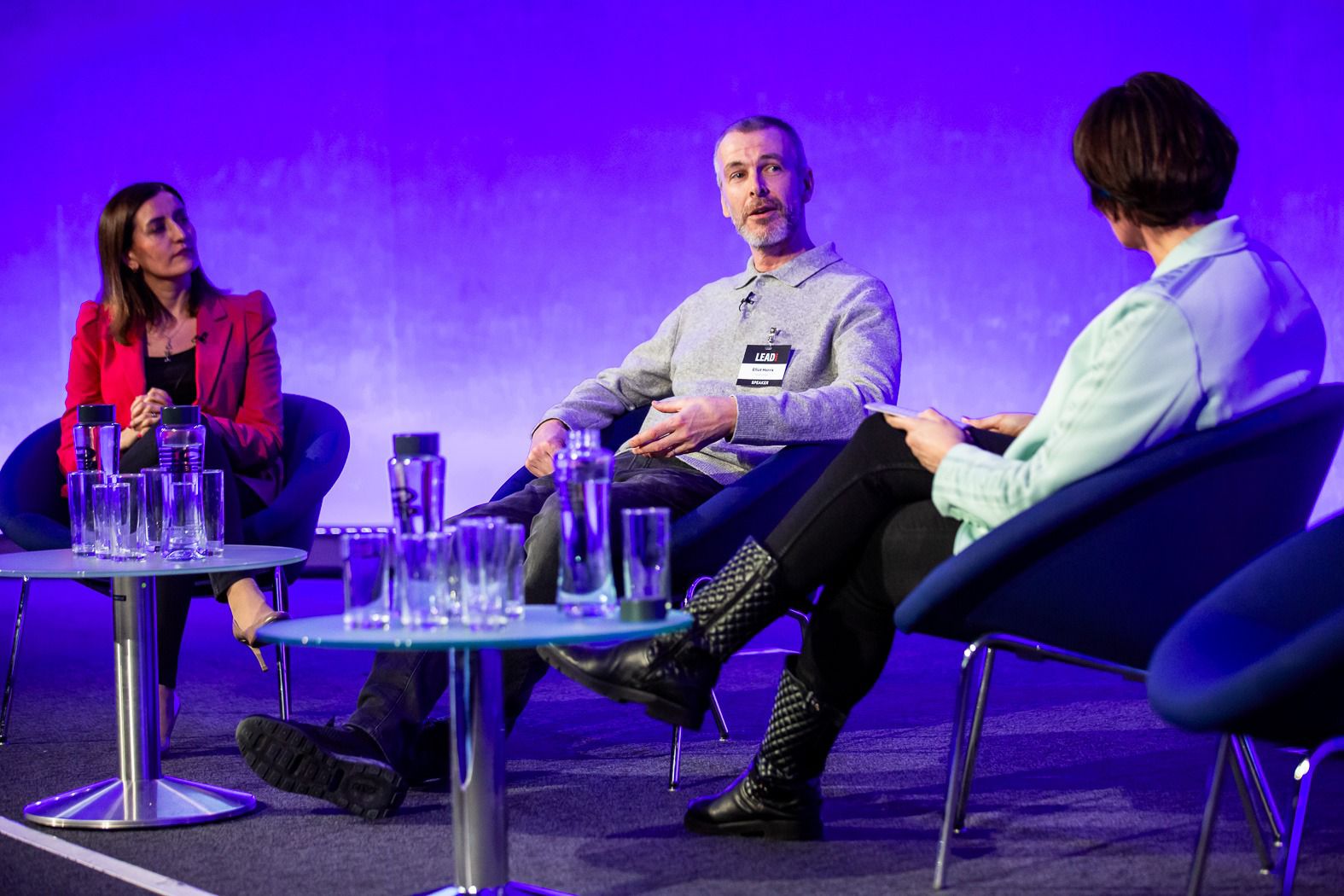
Beyond Representation: Bridging Social Impact and Business Success in Advertising
Channel 4’s Diversity in Advertising Award sets out to improve authentic representation in British TV ads. As the afternoon went on, the next panel session explored how 2022 winners Vanish and Havas London’s portrayal of a disability not only had far-reaching social impact and business success, but was also transformative for the brand.
Veriça Djurdjevic, chief revenue officer at Channel 4, hosted the discussion between Elliot Harris, creative partner at Havas London and Cigdem Kurtulus, global brand director at Reckitt.
They first dug into the impact of Vanish’s story about one girl with autism’s life made for society and the Reckitt brand’s business. Cigdem justified Vanish’s right to take part in this journey: “We are a brand that can give life to clothing,” she said. As clothing can serve an important role in the lives of those with autism, there was a clear link between the product and the social shortcoming the campaign was trying to fix.
Elliot stressed the importance of relying on the expertise of charity partner Ambitious About Autism to make sure the storytelling was authentic to the real lives and challenges people with autism face. In fact the story was always morphing to more accurately reflect the real life of Ash – the real girl who was cast alongside her family and friends to star in the ad. That demanded a lot of patience and trust from the client, as the idea shifted drastically. With a director like Tom Hooper helming it, the lack of script or process may have been less of a worry, But Elliot says that it was “proper on-the-hoof documentary filmmaking”. He estimates they shot about 60 hours of footage. Now the “difficult second album” is in the works.
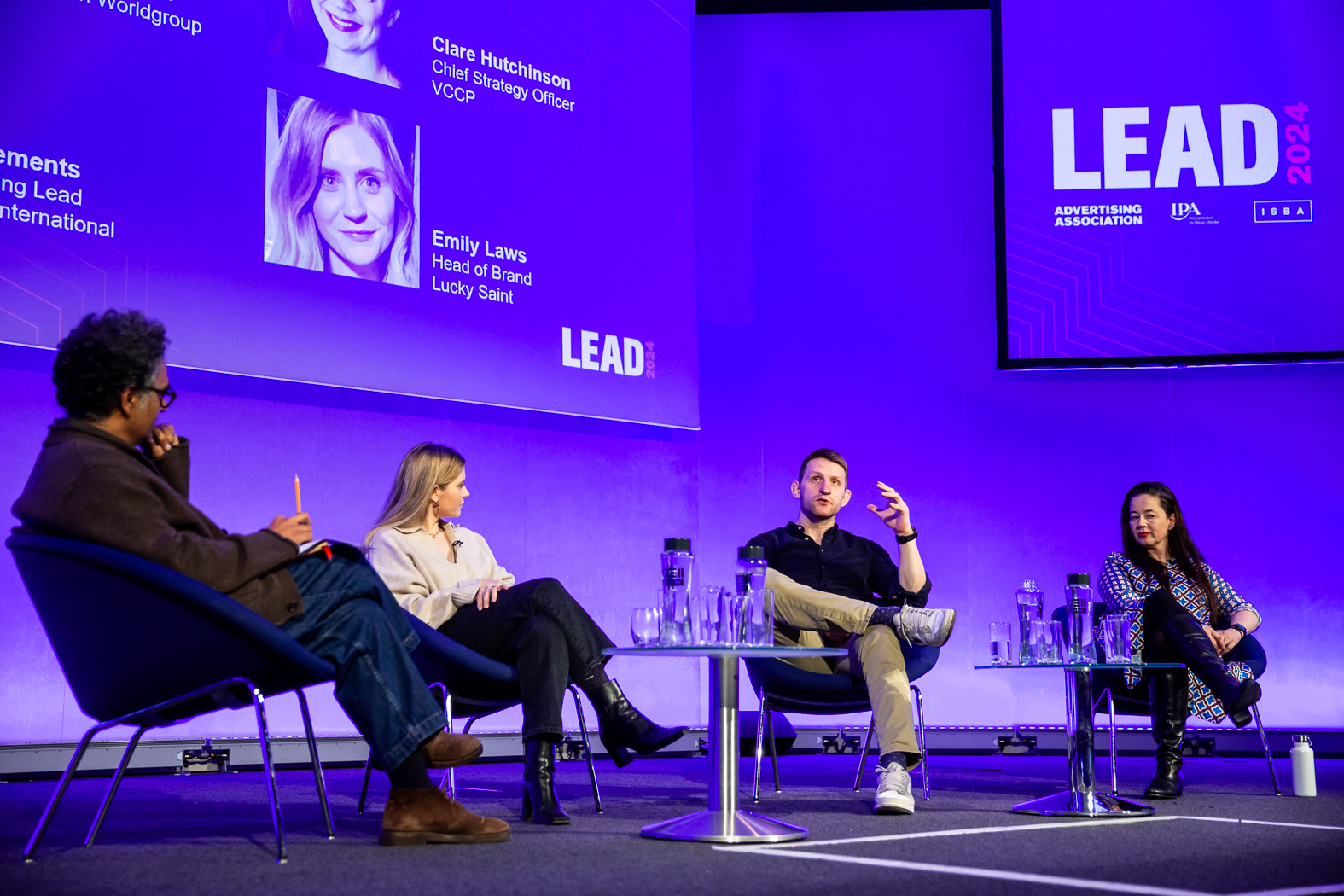
The Challenge as the Creative Opportunity
Are growth challenges different for a household name and an emerging brand? Cadbury and Lucky Saint both face hurdles when it comes to creating effective, relevant advertising. Do brands become less agile with age, or does reputation and history allow for bigger, bolder moves? These were the questions that the final LEAD 2024 session posited.
On stage to consider them wereDavid Clements, UK marketing lead, at Mondelez International, Clare Hutchinson, chief strategy officer at VCCP, Emily Laws, head of brand at Lucky Saint and Harjot Singh, global chief strategy officer at McCann & McCann Worldgroup.
The conversation started with brass tacks – the subject of growth. As a challenger brand, Emily shared that Lucky Saint doesn’t obsess about jumping on trends and taking every opportunity possible. Giving a nod of admiration to David and the Cadbury’s brand, she said the alcohol-free beer brand would love to have the longevity and consistency to get to a 200th anniversary, like the British chocolate giant just did. Clare, speaking as Cadbury’s agency partner, laid out the route to growth as “always the same, always different.” The sameness of Cadbury, David noted, is the generosity at the heart of its history. And, if done properly “familiarity breeds content, rather than contempt,” quipped Clare.
It’s not just about doing the same thing over the years and decades of course. “Staying the course,” as David noted, is not simple repetition. It’s about responding to the many challenges that come along with a consistent value system to guide how a brand navigates them.
While Cadbury’s biggest growth challenge, David told the panel, is understanding consumers, Lucky Saint is looking most closely at its awareness, said Emily. There’s a lot of building ahead before they get to the iconic status Cadbury holds.
The panel went on to weigh scale versus precision and creativity versus data, inevitably landing on a sweet spot that keep all of these in balance and synergy. “When I see some of the work that is done at scale with personalisation, a lot of it can leave me feeling quite cold. Data makes logical sense but it doesn’t necessarily make emotional sense,” said Clare.
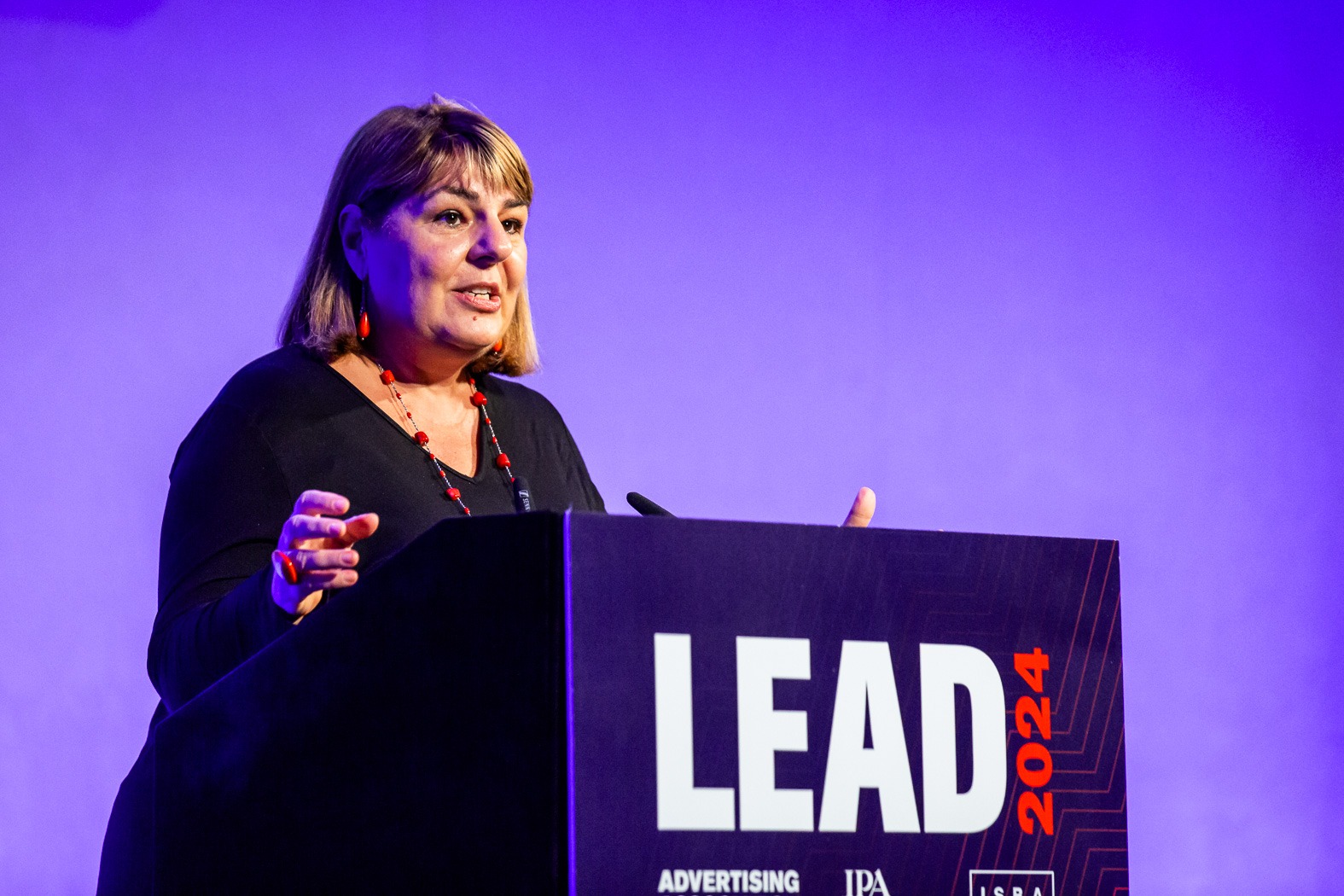
Responsible Growth: What Next?
In this closing speech, AA president Alessandra Bellini set out what the industry should do next to make a responsible contribution to the UK’s social and economic growth. She underlined the crucial role of partnership with government, collaboration between different kinds of business, but those feel “a bit too passive”, she noted. Interdependence is the model for progress, said Alessandra, based on a foundation of trust, and helping to build trust in UK advertising. Responsible growth must be sustainable too.
A year since she put talent at the centre of her agenda, talent is still at the core of Alessandra’s attention as AA president. Attracting, developing and retaining talent are goals that the AA has been delivering tools and support to its members for, she reminded the adlanders in the room. Ending on one of the day’s slogans: “It all works if it all works.”
All photos by Bronac McNeill.













